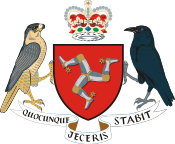
The government of the Isle of Man is a parliamentary representative democracy. The Monarch of the United Kingdom is also the head of state of the Isle of Man, and generally referred to as "The King, Lord of Mann". Legislation of the Isle of Man defines "the Crown in right of the Isle of Man" as separate from the "Crown in right of the United Kingdom". His representative on the island is the Lieutenant Governor of the Isle of Man, but his role is mostly ceremonial, though he does have the power to grant Royal Assent.
The Courts of England and Wales, supported administratively by His Majesty's Courts and Tribunals Service, are the civil and criminal courts responsible for the administration of justice in England and Wales.

Tynwald, or more formally, the High Court of Tynwald or Tynwald Court, is the legislature of the Isle of Man. It consists of two chambers, known as the branches of Tynwald: the directly elected House of Keys and the indirectly chosen Legislative Council. When the two chambers sit together, they become "Tynwald Court".

The courts of Scotland are responsible for administration of justice in Scotland, under statutory, common law and equitable provisions within Scots law. The courts are presided over by the judiciary of Scotland, who are the various judicial office holders responsible for issuing judgments, ensuring fair trials, and deciding on sentencing. The Court of Session is the supreme civil court of Scotland, subject to appeals to the Supreme Court of the United Kingdom, and the High Court of Justiciary is the supreme criminal court, which is only subject to the authority of the Supreme Court of the United Kingdom on devolution issues and human rights compatibility issues.

The Supreme Court of Tasmania is the highest State court in the Australian State of Tasmania. Together with the Magistrates Court, it forms the judiciary in Tasmania. In the Australian court hierarchy, the Supreme Court of Tasmania is in the middle level, with both an appellate jurisdiction over lower courts, and decisions made by Court to be heard on appeal by the High Court of Australia.

In England and Wales, a magistrates' court is a lower court which hears matters relating to summary offences and some triable either-way matters. Some civil law issues are also decided here, notably family proceedings. In 2010, there were 320 magistrates' courts in England and Wales; by 2020, a decade later, 164 of those had closed. The jurisdiction of magistrates' courts and rules governing them are set out in the Magistrates' Courts Act 1980.

A Deemster is a judge in the Isle of Man. The High Court of Justice of the Isle of Man is presided over by a deemster or, in the case of the appeal division of that court, a deemster and the Judge of Appeal. The deemsters also promulgate the Laws on Tynwald Day by reading out brief summaries of them in English and Manx.

The High Bailiff is a legal position held within the Isle of Man. The High Bailiff is the head stipendiary magistrate.

There are various levels of judiciary in England and Wales—different types of courts have different styles of judges. They also form a strict hierarchy of importance, in line with the order of the courts in which they sit, so that judges of the Court of Appeal of England and Wales are given more weight than district judges sitting in county courts and magistrates' courts. On 1 April 2020 there were 3,174 judges in post in England and Wales. Some judges with United Kingdom-wide jurisdiction also sit in England and Wales, particularly Justices of the United Kingdom Supreme Court and members of the tribunals judiciary.

The Staff of Government Division of the High Court of Justice is the Court of Appeal in the Isle of Man. It hears all appeals, both criminal and civil, from the High Court. It is the second highest court in the Isle of Man with final appeal going to the Judicial Committee of the Privy Council acting as 'The Queen in Council'.

The High Court of Justice of the Isle of Man is governed by the High Court Act 1991. There are four permanent judges of the High Court:

The following outline is provided as an overview of and topical guide to the Isle of Man:

The lieutenant governor of the Isle of Man is the Lord of Mann's official personal representative in the Isle of Man. He has the power to grant royal assent and is styled "His Excellency".

The High Court of Justice in London, known properly as His Majesty's High Court of Justice in England, together with the Court of Appeal and the Crown Court, are the Senior Courts of England and Wales. Its name is abbreviated as EWHC for legal citation purposes.

The Courts of Jersey are responsible for the administration of justice in the Bailiwick of Jersey, one of the Channel Islands. They apply the law of the Island, which is a mixture of customary law and legislation passed by the legislature, the States Assembly.

The basis of the Bahamian Law and legal system lies within the English Common Law tradition. Justices of the Supreme Court, Registrars and Magistrates are all appointed by The Governor-General acting on the advice of the Judicial and Legal Service Commission, which is composed of five individuals who are headed by the Chief Justice as their chairman. The Chief Justice and the Justices of the Court of Appeal, including the President, are appointed by the Governor-General on the recommendation of the Prime Minister after consultation with the Leader of the Opposition. Once appointed, the salaries and other terms of appointment of the Chief Justice, Justices of Appeal and Justices of the Supreme Court cannot be altered to their disadvantage. Justices of the Supreme Court can serve until the age of 65 years and, where agreed among the judge, the Prime Minister and the Leader of the Opposition, may serve until the age of 67. Justices of Appeal can serve until the age of 68 years and, where agreed among the judge, the Prime Minister and the Leader of the Opposition, may serve until the age of 70 years. The law of the Bahamas makes provisions for the appointment of 12 Justices to the Bench of the Supreme Court, inclusive of the Chief Justice, and for five Justices of the Court of Appeal, inclusive of the President. The Chief Justice, as Head of the Judiciary, is an ex officio member of the Court of Appeal, but only sits at the invitation of the President.
The Judiciary of Sri Lanka are the civil and criminal courts responsible for the administration of justice in Sri Lanka. The Constitution of Sri Lanka defines courts as independent institutions within the traditional framework of checks and balances. They apply Sri Lankan Law which is an amalgam of English common law, Roman-Dutch civil law and Customary Law; and are established under the Judicature Act No 02 of 1978 of the Parliament of Sri Lanka.

The judiciary of British Virgin Islands is based on the judiciary of the United Kingdom. The British Virgin Islands is a member state of the Eastern Caribbean Supreme Court. The courts are organized at four levels, including the provision for final appeal to the Judicial Committee of the Privy Council in London.

The Courts of Guernsey are responsible for the administration of justice in the Bailiwick of Guernsey, one of the Channel Islands. They apply the law of the Island, which is a mixture of customary law dating back as far as the 10th century and legislation passed by the legislature, the States of Deliberation.

The Royal Court is the principal and oldest court in Jersey, and exercises both criminal and civil jurisdiction. It can sit in a number of configurations, depending on the type of case and the powers to be exercised.












